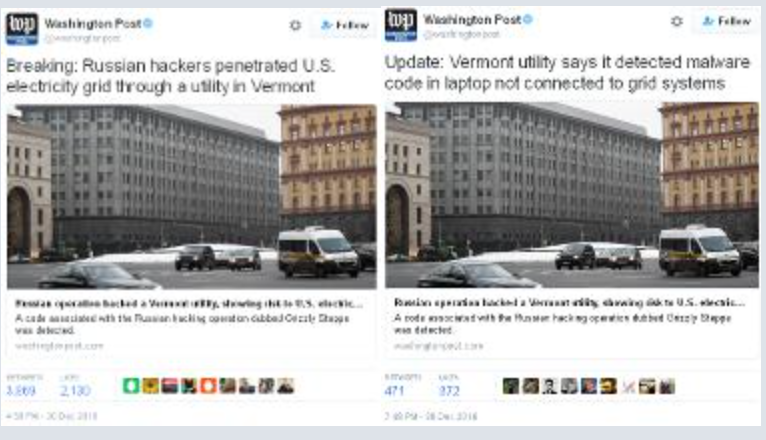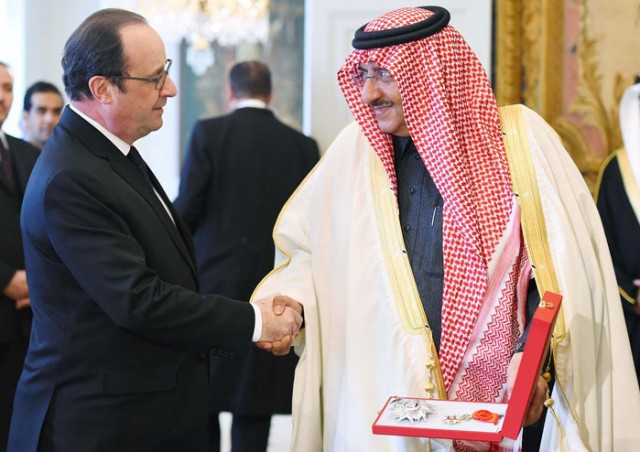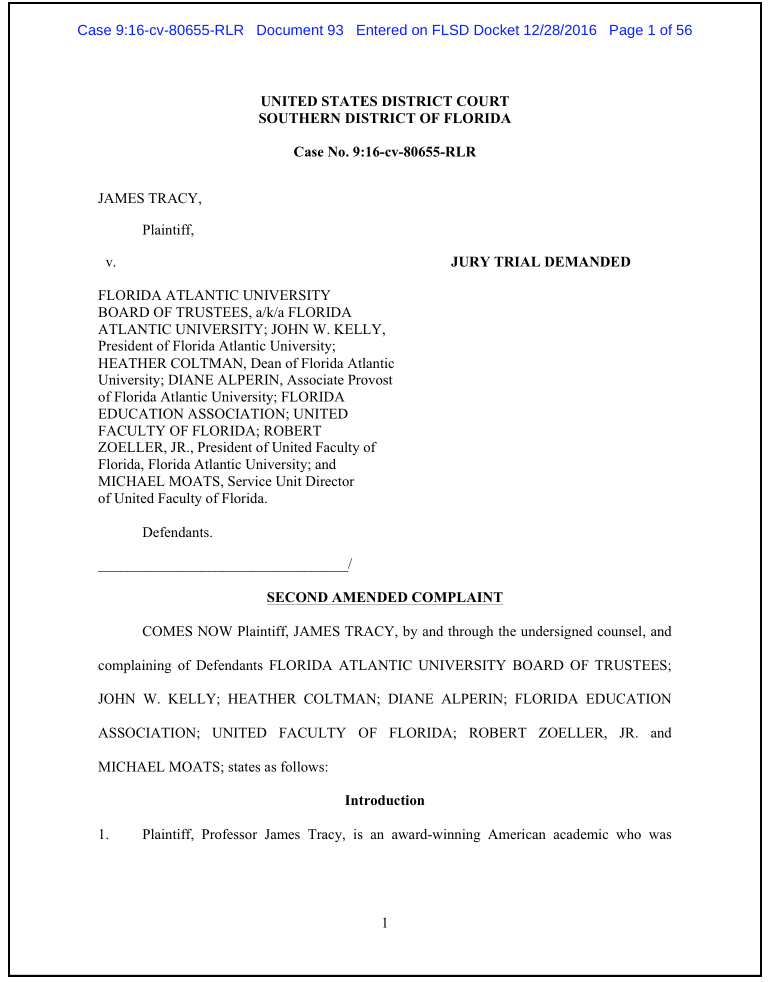This article by prominent academic Prof. Rodrigue Tremblay was first published with foresight in June 2016
“The evil that men do lives after them.” — William Shakespeare (1564-1616), ‘Julius Caesar’
The Constitution supposes, what the History of all Governments demonstrates, that the Executive is the branch of power most interested in war and most prone to it. It has accordingly with studied care, vested the question of war in the Legislature…
No nation could preserve its freedom in the midst of continual warfare.
— James Madison (1751-1836), in a letter to Thomas Jefferson, 1798, (and, in ‘Political Observations’, 1795)
Kings had always been involving and impoverishing their people in wars, pretending generally, if not always, that the good of the people was the object. This, our [1787] Convention understood to be the most oppressive of all Kingly oppressions; and they resolved to so frame the Constitution that no one man should hold the power of bringing this oppression upon us.
— Abraham Lincoln (1809-1865), in a letter to William Herndon, 1848
“…War is sometimes necessary, and war at some level is an expression of human folly.”
— Barack H. Obama (1961- ), Nobel Peace Prize acceptance speech, Dec. 2009
As a nuclear power, as the only nuclear power to have used a nuclear weapon, the United States has a moral responsibility to act… today, I state clearly and with conviction America’s commitment to seek the peace and security of a world without nuclear weapons.
— Barack H. Obama (1961- ), in a speech in Prague, Czech Republic, on April 5, 2009, [N.B.: On May 27, 2016, Pres. Obama repeated essentially the same commitment at Hiroshima’s Peace Memorial Park, in Japan, calling for a “world without nuclear weapons”.]
As commander-in-chief, I have not shied away from using force when necessary. I have ordered tens of thousands of young Americans into combat…
I’ve ordered military action in seven countries. [Afghanistan, Iraq, Libya, Syria, Pakistan, Yemen and Somalia]
— Barack H. Obama (1961- ), in a speech at the American University, Aug. 5, 2015
Ever since Neocons de facto took over American foreign policy, after the collapse of the Soviet empire in 1991, rejecting the ‘Peace Dividend’ that many had expected, the cry in Washington D.C. has been to impose an America-centered New World Order by military means.
Successive administrations, both republican and democratic, have toed the line and dutifully pursued the same policy of world domination by launching a series of direct or covert wars of aggressionaround the world, in violation of international law. This explains why the United States has over 1,400 foreign military bases in over 120 countries, and why they are being expanded.

Prof. Rodrigue Tremblay
First there was the Iraq war of 1991, when Saddam Hussein’s regime felt into a trap, thinking it had Washington’s tacit go ahead to integrate Kuwait, a territory that had been part of Iraq throughout the nineteenth century and up until World War I. Then there was the 1998-1999 U.S. military intervention in Yugoslavia’s ethnic conflicts, in order to undermine Russian influence. The “Pearl Harbor” type attack of 9/11, 2001, was a “god-given” event on the march to the New World Order, since it justified huge increases in the U.S. military budget and served as a justification to launch the 2001 war inAfghanistan, eventually leading to a U.S.-led “preventive war” to “liberate” Iraq, in 2003.
All this was followed by a string of covert operations to overthrow governments, elected or not, and to impose regime changes in independent countries, such as in Syria, Libya, Ukraine, Honduras, Haiti, Somalia… etc.
The election of Senator Barack Obama, in 2008, was expected to stop these destructive American military vendettas around the world, most of them under the initiative of the Executive, with little input from Congress, as stipulated in the U.S. Constitution. After all, in 2009, President Obama accepted the Norwegian Nobel Peace Prize, which carried a stipend of about $1.4 million, for his promise of creating a “new climate” in international relations and of promoting nuclear disarmament. Instead, it can be said that “Two Full Terms of War” is the legacy of his two terms in office. Mr. Obama didn’t settle any war, and he initiated many more.
In accepting the Nobel Peace Prize, President Obama, referring to the more or less discredited theory of “Just War” in modern times, saidthat wars must be waged “as a last resort or in self-defense; if the force used is proportional; and if, whenever possible, civilians are spared from violence.”
Note, however, that Obama was honest and lucid enough to acknowledge that there were people “more deserving” than him to receive such a peace prize, stating that his “accomplishments were slight”. —As it turned out, he was right. Antiwar candidate Obama did not rise to the high expectations placed on him in 2008: He did not bring peace to the world; he did not stop American wars of aggression around the world, he did not stop the American policy of overthrowing other independent countries’ governments, nor did he bring “nuclear disarmament”. In the latter case, he did just the reverse, as we will see below.
That is why, after a double mandate in the White House, it can be demonstrated that President Barack Obama’s legacy is indeed very slight, if not net negative. Let us look more closely, beginning with the positive side of President Obama’s legacy, and following with the severe failures of his administration.
Obamacare: A timid step in the right direction toward social justice
Before spelling out the Obama administration’s main failures, it is only fair to stress some important successes it has achieved, even though some may deplore that they have been few and far between. For one, in domestic affairs, President Obama succeeded in getting aPatient Protection and Affordable Care Act, aka Obamacare, passed by Congress, in 2010. That law brought health coverage to close to some20 million Americans who previously had been left out of secured access to health services through employer-sponsored insurance. A similar attempt by Hillary Clinton in 1993 had failed.
Obamacare, a private-based health insurance program, was copied from a Republican program signed into law in Massachusetts, in 2006, by then Governor Mitt Romney. The initial objective was to adopt a universal health plan similar to the 1965 single-payerMedicare program for the elderly, but Republican opposition in Congress made that option impossible. It is estimated that slightly more than 30 million Americans are still lacking comprehensive health insurance. Nevertheless, it can be said that the Obamacare program, even though flawed, was a step in the right direction.
It is worth noting, however, that many American doctors are in favor of a Single-Payer Health system. Last May, an impressive group of 2,231 physicians called for the establishment of such a system to cover all Americans in need of medical care. The only presidential candidate, this time around, who proposes a universal single-payer health system, is Senator Bernie Sanders.
President Obama has, on occasion, stood up to pro-war pressures
In foreign affairs, President Barack Obama has taken some initiatives, which have distanced himself from President George W. Bush, by resisting pressures to enlarge some ongoing military conflicts.
For instance, in 2013, the governments of Israel, Turkey and Saudi Arabia, anxious to overthrow the Syrian government of Bashar al-Assad, orchestrated what is widely believed to have been a false flag operation, in order to place the blame on the Assad government for having allegedly used chemical weapons against rebels. The objective was to provoke a hesitant Obama administration into getting involved militarily in the Syrian conflict. Such a gimmick had worked in 1986 in persuading the Reagan administration to bomb the country of Libya.
To his credit, President Obama did not fall for the plot, and resisted the “intense” pressures coming from neocons, and from Secretary of State Hillary Clinton in his own administration, for a direct U.S. military involvement in Syria. He backed instead a Russian proposal to remove chemical weapons from Syria, thus avoiding the deaths of thousands of people.
The Iran deal as a triumph of diplomacy over waging destructive wars
Other neocon-inspired pressures were exerted on President Obama, coming also from the Israeli government, to have the U.S. launch military attacks against Iran, a country of 80 million people. The pretext advanced this time was that Iran was threatening Israel’s nuclear monopoly in the region in allegedly developing a nuclear weapon of its own.
Even though the Iranian government asserted that its nuclear program was to produce energy and was exclusively peaceful, President Obama was under strong pressure to attack Iran “preventively” to destroy its nuclear installations. To his credit, President Barack Obama resisted the pressures to launch what would have been another illegal war of aggression, similar to the one George W. Bush initiated against Iraq in 2003.
Instead, President Obama opted to rely on diplomacy, and on July 14, 2015, six countries (China, France, Germany, Russia, the U.K. and the United States) reached an Iran deal, which removed the possibility that Iran develop nuclear weapons in the foreseeable future. Here again, an unnecessary war was avoided and thousands of lives were saved.
The ending of more than half a century of an American boycott of Cuba
President Barack Obama must also be congratulated for having accepted Pope Francis’ mediation, in 2014, to end the more than half a century of hostilities between the government of the United States and the government of Cuba, two neighboring countries. The Pope had written a personal appeal to Presidents Barack Obama and Raul Castro and led closed-door negotiations between the delegations of both countries.
In December 2014, U.S. President Barack Obama and Cuban President Raul Castro announced that they would begin normalizing diplomatic relations between the two nations. On April 11, 2015, President Obama and Cuban President Castro met in Panama to finalize the new reality and declared themselves ready to “turn the page and develop a new relationship between our two countries”, in Mr. Obama’s words.
Since then, the two leaders have reopened embassies in each other’s countries and normalized exchanges. President Obama even visited Cuba in March 2016.
Therefore, President Obama’s decision put an end to a sad chapter in the history of 20th Century American foreign policy, especially considering that the U.S. government has established full diplomatic relations with countries such as China and Vietnam.
The list of favorable actions by the Obama administration is not very long. There is, however, a longer list of policies that belie many of Barak Obama’s promises and the expectations he created when he ran for president in 2008.
President Obama enlarged the powers of the White House to launch imperial wars with no temporal or geographical limits
As the quote above by James Madison indicates, the U.S. Founding Fathers were well aware of the danger of giving a king or dictator the right to launch wars on his own. They feared that this would bring tyranny and oppression to their nation.
President George W. Bush, in power from 2001 to 2009, behaved in a way the U.S. Founding Fathers would have strongly disapproved, since he vied with the Congress to concentrate the power to wage war in his own hands, using Congress as a rubber stamp.
One would have thought that newly elected President Barack Obama, in a democratic spirit, would have attempted to reverse this dangerous move toward turning the U.S. presidency into an initiator of foreign wars. Unfortunately, President Barack Obama did the reverse, increasing rather than reducing the president’s discretionary powers to wage wars.
Indeed, Nobel Peace Laureate Obama didn’t waste any time in arguing that he had, as U.S. president, the authority to wage war in Iraq, in Syria, in Libya, or elsewhere, without U.S. Congress’s approval, contending that previous so-called ‘use of force congressional authorizations’ remain in effect indefinitely. Indeed, President Obama claimed, just as President George W. Bush had done before him, that the broad ‘Authorization for use of Military Force’ on terror (AUMF) passed by Congress after Sept. 11, 2001, and the 2002 ‘Authorization to use Military Force’ in Iraq had, in fact, no expiration date and that they authorize an American president to act like an emperor or a king, and to unilaterally use military force or wage war of his own volition.
This is a very serious matter, because if this theory were to be confirmed and entrenched in practice, without a formal constitutional amendment, the precedent would mean that the U.S. Constitution hasde facto been pushed aside and the United States has become less of a republic, and more of an empire. [This would tend to confirm the title of my book ‘The New American Empire’]
What is more, President Obama has acted aggressively according to his theory of presidential war powers. He has launched eight times as many drone strikes in other countries as did President George W. Bush; and, according to his own boasting, he has “ordered military action in seven countries”. This is not a legacy he should be proud of.
The destruction of the independent nations of Iraq, Libya and Syria and the worsening of the chaos in the Middle East
As far as U.S. involvements in the Middle East are concerned, President Barak Obama did not substantially break away from the neocon-inspired imperial policies of the George W. Bush administration.
It is sometimes argued that president Obama’s decision to withdraw American troops from Iraq, in 2011, marked a break with the previous administration. In fact, the Bush-Cheney administration had already decided on such a withdrawal in 2008, when the Iraqi government refused to grant legal immunity to American troops in that country.
In supervising the withdrawal of troops from Iraq, the Obama administration was simply implementing a Status of Forces Agreement (SOFA), which had previously been signed between the U.S. government and the Iraqi government to that effect. According to the agreement, U.S. combat troops had to be out of Iraq by December 31, 2011.
With one or two exceptions mentioned above (the Iran deal and the normalizing of relations with Cuba), President Obama has not failed to embrace a military solution to serve the neocons’ many narratives in the Middle East and elsewhere.
In fact, if it can be said that President George W. Bush destroyed the country of Iraq, President Barack Obama, through his policies and actions, most of the time without the support of Congress, destroyed two other Middle East countries, i.e. Libya and Syria, while extending the U.S. military mission in Afghanistan, and while supporting an embarrassing ally, Saudi Arabia, in destroying Yemen.
These countries were no threat to the United States. Even though President Obama received a Nobel Peace Prize, he was no peace president, by a long shot. With his administration, it was really more of the same and a far cry from his campaign promises to “change things in Washington D.C.”
Under the cover of fighting terrorism, and to destabilize, divide and provoke “regime changes” in Libya and in Syria, for example, the United States—but also European countries such as France and the U.K., leading members of NATO—has relied on covert operations to support foreign mercenaries and Islamist groups of terrorists in these countries, giving them arms and logistics support, and inciting them to overthrow the established governments.
Thanks to the financial assistance given these terrorist groups, especially the self-proclaimed Sunni Islamist State (ISIS), by Sunni countries such as Saudi Arabia, Qatar or Turkey, the pro-Israeli neocons, who wanted to redraw the Middle East according to their mad theory of “constructive chaos”, have succeeded beyond their wildest dreams, with a devastating international refugee crisis as an extra. Ironically, European countries are, for now, the main victims of the waves of refugees resulting from the politics of chaos.
As the de facto head of NATO, President Barack Obama and his neocon advisers, with the latter’s Manichean view of the world, must bear a large part of the responsibility for these disastrous results. The chaos in the Middle East is a huge failure for him, even though the neocons in his administration would deem such a manufactured chaos, a success!
Indeed, the countries of Iraq, Libya and Syria were considered, to different degrees, to be regional rivals of Israel, besides having large reserves of oil. Moreover, the latter countries have been on top of the list of seven countries discovered by General Wesley Clark, in late September 2001, as being the very countries the Pentagon planned to attack and destroy.
The destruction of Iraq can be attributed to the Bush-Cheney administration, since they are the politicians who used different subterfuges to launch an illegal war of aggression against that country, on March 20, 2003. However, what is most amazing is the fact that the Obama administration decided to follow the same policy in Libya and in Syria. Sooner or later, Mr. Barack Obama will have to explain why.
President Obama has sided with Saudi Arabia and other Islamic countries in their efforts to spread Wahhabi extremism around the world
The free world, and especially Western Europe, is under the threat of the most virulent brand of Islamism, i.e. Wahhabi extremism, a theo-fascist ideology, which is promoted by the Kingdom of Saudi Arabia and other Islamic countries, and which is, to a large extent, behind global Islamic terrorism. Instead of denouncing that curse of the 21st Century, President Obama has gone out of his way to be subservient and even to bow to the leaders of Saudi Arabia during multiple trips to that country. The question has been often raised: Why has President Obama been so cozy with the Saudi Royal Family, even when the lattersnubbed him publicly?
There is no country in the world that violates more openly basichuman rights than the Kingdom of Saudi Arabia. One would think the United States would be at the forefront to denounce such violations. The Wahhabi, either from Saudi Arabia or other Islamic countries, have used hundreds of billions of petro-dollars to build madrassas andhuge mosques in Western countries, including in the United States, to promote their corrosive ideology. The Obama administration did not raise any objection when the largest mosque in the United States was built, in Lanham, Maryland. It is worth noting that, in 2010, Norwaydid refuse the construction of mosques in that country with foreign money.
The Obama administration has extended the neocon-inspired politics of chaos to Ukraine and Russia, and it has rekindled a Cold War II with Russia
Why has the Obama administration been so anxious to start a New Cold War with Russia? We see here another contradiction between what President Barack Obama says, and what he does. For a Nobel Peace Prize laureate, are an aggressive military encirclement of a country and the sending of military forces to its borders acts of peace or acts of war? Why is Obama doing precisely that to Russia? Why is he risking a nuclear confrontation with Russia? That defies logic.
The only stretch of logic to explain such warmongering is that it is an attempt by the U.S. government to sabotage any economic and political cooperation between Russia and European countries, in order to keep Europe under some sort of an American protectorate.
Why is President Obama following the neocon plan? Why did he choose Ashton Carter as Secretary of Defense, a known warmonger and the Pentagon’s former chief weapons buyer, who is on record as wanting a military confrontation with Russia?
These are important questions that should be addressed to Mr. Obama, and all the more so since Democratic presidential candidate Hillary Clinton has indicated she would push in the same direction, if she were elected president.
Let us keep in mind that in February 2014, the Obama administration eagerly jumped at the opportunity to support a coup in Ukraine to overthrow that country’s elected government. It also armed the putchists, and encouraged them to commit atrocities against Ukraine’s ethnic Russian population. Such interference in the affairs of another nation is part of a larger neocon-inspired policy of militarizing Eastern Europe under the cover of NATO.
President Obama’s personal contribution to the nuclear arms race and to the threat of nuclear war
Even though president Barack Obama promised a nuclear-free world, and pledged, in a speech delivered in Prague, on April 5, 2009, “to seek the peace and security of a world without nuclear weapons” and to “reduce the role of nuclear weapons in our national security strategy”, and again in Hiroshima, on Friday May 27, 2016, his words have not been followed by concrete steps in that direction. Instead, Mr. Obama seemed satisfied to passively pursue the same nuclear “modernization” program that involved the development of a new set of American nuclear weapons, initiated under the previous George W. Bush administration.
On September 30, 2004, then Democratic presidential candidate John Kerry, in a debate with President George W. Bush, complained that the Bush administration was “spending hundreds of millions of dollars to research bunker-busting nuclear weapons. The United States is pursuing a new set of nuclear weapons. It doesn’t make sense. You talk about mixed messages. We’re telling other people, ‘You can’t have nuclear weapons,’ but we’re pursuing a new nuclear weapon that we might even contemplate using.”
In a Nuclear Posture Review on April 6, 2010, the Obama administration seemed to echo Mr. Kerry and stated that the United States would “not develop new nuclear warheads or pursue new military missions or new capabilities for nuclear weapons.”
However, President Barack Obama wasted no time in violating his promise of not “developing new nuclear warheads” and of “reducing the role of nuclear weapons in U.S. military strategy”. Instead, he seemingly embarked on the same nuclear program, which had apparently not been stopped at all, to develop an array of new nuclear weapons that made contemplation of their use more acceptable (smaller, more accurate, less lethal), just as the Bush II administration had done before. In other words, Mr. Obama has prepared the United States to get engaged in “small nuclear wars” in the future. This is quite a “legacy”!
The new American nuclear weapon is, as the New York Times has reported, the B61 Model 12, a nuclear bomb tested in Nevada in 2015. This is the first of five new nuclear warhead types planned as part of an American atomic revitalization program budgeted at a cost estimated at $1 trillion over three decades. So much for “a world without nuclear weapons”!
Domestically, income and wealth inequalities have continued to rise to high levels and poverty to increase under the Obama administration
On Jan. 20, 2014, a Gallup poll found that two-thirds of Americans were dissatisfied with the way income and wealth are distributed in the U.S. —People are therefore vaguely aware that there is something fundamentally wrong with the way the economic system works, and they are right to think that the economy is rigged against the interests of the majority and in favor of special interests.
According to a new Pew Research Center analysis of public data, the American middle class is shrinking, its proportion among U.S. households falling from 55 percent in 2000 to 51 percent in 2014. [N.B.: An American middle class family of two adults and two children, in 2014, is one earning a minimum of $48,083]. This shift has produced a wave of discontent throughout the United States.
Presidential candidates Donald Trump and Bernie Sanders, on opposite sides of the electoral spectrum, reflect this deep dissatisfaction and even the anger at the economic, financial and taxation policies pursued by the U.S. government and the establishment, over the last thirty years.
Indeed, for the last fifteen years, from 1999 to 2014, the median income of American households globally has declined by 8 percent.
-The median incomes of lower-income families fell by 10 percent during the same period, from $26,373 to $23,811.
– The median income of middle-income households decreased by 6 percent, from $77,898 to $72,919.
– And, reflecting the large inequalities even among upper-income households, the median income in that group also fell by 7 percent, even though, as a group, the relative importance of this segment of American households went from 17 to 20 percent. The group’s median income fell from $186,424 in 1999 to $173,207 in 2014.
In fact, the only segment of the U.S. population that has benefited from the economic, financial and taxation policies of the last three administrations (Clinton-Bush-Obama), and from technological changes that have occurred during the period, is the top echelon of the upper-income class.
The super rich have raked in the most, while profiting the most from various tax loopholes, which have lowered their average tax rate from 27 percent in 1992 to less than 17 percent in 2012. In fact, America’s super rich get richer and they are laughing their way to tax havens!
There is something fundamentally wrong and corrupt going on in the U.S. economy, and obviously, the Obama administration has been unable or unwilling to address the problem.
Official government statistics tend to underestimate real unemployment and real inflation
All those wars waged abroad and the trillions of dollars spent on them have enriched some super wealthy Americans, but not ordinary Americans. Instead, they have impoverished them. Ordinary Americans are falling behind because their incomes are stagnant or falling, and because real unemployment rates and inflation rates are higher than reported.
According to official statistics, the annual rates of unemployment and of inflation (the consumer price index) would seem to be under control. For the first quarter of 2016, the U.S. unemployment rate hovers around 5.0 percent, while the inflation rate is just above 1.0 percent, pushed down by the decline in oil prices and by a relatively strong U.S dollar.
The problem with official statistics, however, is that the method to measure them has changed over time. This doesn’t mean that the new measures are willfully misleading. It only means that the old measures may be a better indicator of how unemployment and inflation impact certain sectors of the population.
In fact, some economists prefer to rely on the old methods of calculating unemployment and inflation to get a more realistic picture of what ordinary people are going through. For example, U.S. economist Walter J. Williams calculates so-called “alternate” statistics of unemployment and inflation.
For unemployment, certain categories of unemployed people have been excluded from the published official statistics. For instance, long-term and short-term discouraged workers, not actively searching for work, were excluded from the new official measure of unemployment rates, in 1994. Neither do official statistics count part-time workers who are forced to work part-time because they cannot find full-time employment.
As a consequence, when labor force participation rates drop because of the above, official unemployment figures indicate a decline in unemployment, even though this is not really exact. According to some estimates, if unemployment and underemployment were taken into consideration, the alternate rate of unemployment, in April 2016, would have been 22.9 percent, not the narrow official measure of 5.0 percent.
Similarly, official measures of inflation were changed in 1980 and in 1990, as a way to reduce the annual cost-of-living-adjustments for retirement benefits. For instance, when the price of certain items increases, they are replaced in the basket of consumer goods by other items, which cost less. Similarly, even if the price of some goods increases, such increase is reduced by a factor reflecting the higher quality of the goods available. If the old method of calculating inflation had been used, in April 2016, the alternate annual inflation rate would not have been 1.13 percent, as the official CPI measurements indicated, but would have been close to 5.0 percent, according to one measure, and even close to 9.0 percent according to another measure.
All this is to say that when people see their rents, condo fees, taxes, grocery purchases, etc., increase in price, and they experience a drop in their standard of living because of their stagnant or declining incomes, they are not necessarily hallucinating.
The Obama administration has allowed corporations and megabanks to offshore jobs and profits
A major feature of our times is that corporate profits are way up, while wages are stagnant, and corporate taxes are way down.
Indeed, a partial answer to the many issues raised above is the fact that the Obama administration has been guilty of pursuing and even intensifying the move toward lower taxes for corporations, and more profits for large corporations and megabanks on two accounts.
First, the Obama administration has initiated two mammoth international “trade deals”. Those trade “deals” were mostly kept secret because one of their main objectives is to guarantee legal protection to world corporations and megabanks against elected national governments and give them immunity from national prosecution.
The most recent examples of such “deals” are the Transatlantic Trade and Investment Partnership (TTIP) with Europe and the Transpacific Trade Partnership (TTP) with countries in Asia.
It must be understood by all that these so called “free trade” agreements are really not genuine free trade agreements for the unhampered movement of goods between countries, based on comparative national advantages, but are really instead corporate and banking agreements to protect corporations and megabanks against national governments, their taxation and their regulations.
Such agreements, negotiated in near complete secrecy, pursue geopolitical objectives. They are an attempt to build a worldwide economic and financial order that supersedes national states and they represent also an effort to protect the corporate and banking elites—the establishment 1%—against national governments. In the case of the TTIP, its geopolitical objective is to prevent European countries from developing comprehensive trade agreements with Russia. In the case of TTP, the objective is to isolate China. In the eyes of Washington D.C. neocon planners, they are part of ongoing economic warfare.
Second, the Obama administration has not taken the necessary steps to stop rich individuals and profitable corporations and banks from using tax havens and industrial inversion schemes to avoid paying taxes at home.
The Obama administration, and even more so the entire U.S. Congress, are under the influence of those interests whose objective is to build a worldwide economic and financial system that shields the 1% establishment’s wealth and power against any encroachment by national governments, at least from those governments the international elite does not yet fully control. We are talking here about an unelected world economic and financial empire with no frontiers, unencumbered by normal democratic rules.
This may be a big factor in explaining why the economy is languishing. Indeed, when corporate profits are not reinvested in the economy, but are hoarded and stashed away in tax havens, they do not increase domestic demand. U.S. corporations have about $1,400 billion ($1.4 trillion) sleeping in foreign tax havens. If all that money were repatriated, not only would the government have a lower deficit, but also the economy would greatly benefit from increased investments.
This is a somewhat scandalous situation the Obama administration and the U.S. Congress have done very little about. On the contrary, both have been slow in putting a stop to so-called corporate “inversions”, which have allowed companies to find a foreign suitor and switch their headquarters abroad to dodge taxes. Both have also extended patent protection to already entrenched corporations at the expense of startup companies. And it is only recently that they have moved to block so-called megamergers—all developments that have reduced competition, created oligopolies, increased corporations’ market power and raised prices.
This maybe the most glaring example of a lack of economic leadership on the part of the Obama administration, second only perhaps to the imperial wars it has initiated and encouraged. It is true that Mr. Obama has himself little competence or experience in economics and in finance, and that may explain why the above issues have not received all the attention they deserve.
President Barack Obama let neocons infiltrate his administration at the highest levels
After President Obama began making appointments to senior positions in his new administration, in late 2008, a leading neocon, Richard Perle, former chair of the Defense Policy Board under President George W. Bush and a leading architect of the Iraq war, expressed his contentment in these words: “I’m quite pleased… There’s not going to be as much change as we were led to believe.”
Therefore, it can be said that President Obama’s betrayal of his promises to enact change began very early in his administration. For instance, he kept George W. Bush’s Defense Secretary, Robert Gates, in his post, as an indication he wanted continuity and not a break with the previous administration.
Then, he went on paying his electoral debts. First, he named Rahm Emanuel as his White House chief of staff, a neocon member of the House of Representatives, and also a former assistant to President Bill Clinton and a supporter of presidential candidate Hillary Clinton.
Then, in a move that brought glee to the ranks of neoconservatives, he appointed belligerent and neocon-supported Hillary Clinton as Secretary of State. The neoconservative Weekly Standard applauded her nomination, calling her a “Warrior Queen”! Even Bush’s Vice President Dick Cheney declared to be “impressed” with her nomination. As MSNBC’s Joe Scarborough branded her, Hillary Clinton is a “neocon’s neocon”, because “there’s hardly been a military engagement that Hillary hasn’t been for in the past twenty years.”
President Barack Obama went on to appoint a long list of other neocons to senior positions in his administration, not the least being the nomination of Ms. Victoria Nuland, a Dick Cheney adviser, as Assistant Secretary of State for European Affairs, in May 2013. From then on, the die was cast as to what kind of administration President Obama would lead. Real change would have to wait.
President Obama had zero influence in solving the secular Palestinian-Israeli Conflict (1948- )
For nearly three quarters of a century now, the rotten Palestinian-Israeli conflict has endured for two main reasons: the intransigence of the Israeli government in closing the door to any new settlements, and the active pro-Israel veto of the U.S. government at the United Nations.
In 2008, one of presidential candidate Barack Obama pledges was to actively pursue a peace agreement between Israel and the Palestinians. He had, as he said, a two-fold strategy: restoring America’s tarnished image among Muslims and persuading the Israeli government to stop settlement expansion on Palestinian lands. On both accounts, he failed. As it has been the case with Mr. Obama’s other promises, there was less substance behind the rhetoric than met the eye. For example, he did not set up a special task force to implement the policy he professed to wish to put forward.
Consequently, President Barack Obama has had no observable influence in stopping the far-right Netanyahu Israeli government from pursuing its illegal settlements in Palestinian territory. He did not get any success either in persuading the government of Israel to enter into serious peace talks to solve the festering conflict and end the occupation of Palestine. And the reason is obvious: President Obama did not dare withdraw the U.S. veto protecting the state of Israel at the United Nations, even though there were some rumblings to that effect.
Worse maybe, is the fact that President Obama let himself be publicly snubbed and humiliated by Prime minister Benjamin Netanyahu, in early 2015, when the latter disregarded a non-invitation by the Obama administration and nevertheless entered the United States and addressed the U.S. Congress. This created a weird occurrence, because this was a violation of basic diplomatic rules. It was a public display of the Israeli government’s contempt for the American President.
In 2001, Benjamin Netanyahu boasted that he knew “what America is. —America is a thing that you can move very easily, move it in the right direction.” What Netanyahu meant, of course, is that the pro-Israel lobby in the United States is so financially and politically powerful that an Israeli leader can publicly insult the American president, with no consequences, and even with the enthusiastic approval of an obliging U.S. Congress. President Barack Obama never looked so weak and so despondent as during this awkward and unreal situation.
President Obama did not release elements of proof linking Saudi Arabia to the 9/11 terrorists
A last point is also worthy of mention. Despite numerous requests, President Obama has refused to inform adequately the American people on the extent of Saudi Arabia’s involvement in supporting the 9/11 terrorists. The families of the victims of the 9/11 attacks and scores of others have called on Mr. Obama to release the classified 28-page portion of a special House-Senate congressional report on the 9/11 attacks, produced in 2002, and purportedly identifying individuals at the highest levels of the Saudi government as the financing agents of some of the 9/11 terrorists. In mid-April, President Obama even said that a decision to release the information was “imminent”.
After his trip to the Kingdom of Saudi Arabia last April, it seems that the “imminence” of the release was postponed sine die. Rather, President Obama went even further and promised to refuse to sign into law a bill that would have made the kingdom of Saudi Arabia liable for damages stemming from the September 11 terror attacks. However, he did not extend the same privilege to the Government of Iran, which is being sued by Americans for alleged damages.
Even though president Barack Obama promised, on January 29, 2009, “a new era of transparent and open Government”, this seemingly did not apply to the rights of Americans to know who was behind the 9/11 attacks that resulted in 3,000 horrific American deaths. This has led some observers to call his administration “the least transparent in history”. This is another example of Mr. Obama saying one thing and doing the opposite. It seems to be a pattern in hismodus operandi.
General conclusion
Why has there been such a contrast between President Obama’s words and his deeds? After all, he promised “to end the mindset that got us into war”.
There are three possible explanations. First, as a politician, Barack Obama may not have been completely sincere when he said he wanted to change the mentality in Washington D.C. He may have though that these were only words to be soon forgotten. —Politicians are ambitious opportunists and Mr. Obama was not different. Second, those who wrote his speeches may not have been the same ones making the policies. Thus, the gulf observed between the flowery speeches and the actual policies. Third, there is possibly a less generous explanation: Mr. Obama may have been a convenientfigurehead used by those who really control the U.S. government in the shadows. —It could be a mixture of all these explanations.
One can surely argue that the Obama administration, on the whole, was ‘less bad’ than the previous Bush-Cheney administration, both domestically and internationally. However, because elected presidential candidate Barack Obama arrived at the White House without any administrative experience and without having his own brain trust, and seemingly, without having a clear plan on how to implement his lofty promises, he had to submit himself to the same neocon advisers and warmongering interventionists who were omnipresent in the previous administration. He ended up reacting rather than acting; following rather than leading.
That is why the Obama administration’s policies, especially foreign policy, with a few notable exceptions, did not diverge appreciably from those imperial policies pursued by the previous Bush-Cheney administrations. President Barack Obama, the Nobel Peace Prize laureate, has failed to live up to the promises he made and the hopes he raised.
Both neocon-inspired administrations ended up creating an enduring mess in the world that future governments, and even future generations, will have to deal with.
Economist Dr. Rodrigue Tremblay is the author of the book “The Code for Global Ethics, Ten Humanist Principles”, Please visit the book site at: http://www.thecodeforglobalethics.com/ and his blog at: http://www.thenewamericanempire.com/blog.htm
To write to the author: [email protected]



















 I have to say that the one really common thread that I see running through all of the notions of a progressive BI is that they pay great attention to explaining how nice their systems would be but give little if any thought to the concrete prospects of implementation. Before looking further at these deficiencies and proposing an alternative approach, it might be useful to consider more seriously the neoliberal version that is hanging like a sword over all our heads.
I have to say that the one really common thread that I see running through all of the notions of a progressive BI is that they pay great attention to explaining how nice their systems would be but give little if any thought to the concrete prospects of implementation. Before looking further at these deficiencies and proposing an alternative approach, it might be useful to consider more seriously the neoliberal version that is hanging like a sword over all our heads.





















 12. Bottom line: According to the influential report of the WHO Commission on Social Determinants of Health (2008), health inequalities and the violation of the right to health are not consistent with a ‘business as usual’ approach to tackle them.
12. Bottom line: According to the influential report of the WHO Commission on Social Determinants of Health (2008), health inequalities and the violation of the right to health are not consistent with a ‘business as usual’ approach to tackle them.











































